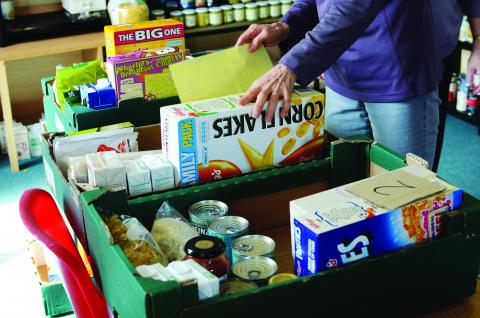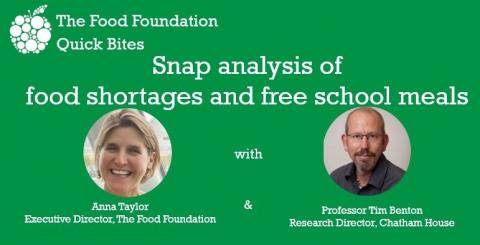22 March 2023
Food Prices Tracker: March 2023

by Josh Day
Food inflation jumps to 18% according to Government data
Food inflation (CPI) has risen to 18.0% compared to last month's 16.7%. This is much higher than general inflation which is currently at 10.4%. The rise in inflation follows national food shortages and accompanies the fastest rise in food prices in 45 years. This sharp rise in inflation has come as a surprise to many, defying the expectation for inflation to level out and begin to fall. With inflation higher in the UK than most major developed economies this is a worrying development in the ongoing cost-of-living crisis.
The cost of The Food Foundation’s Basic Basket has increased by approximately 20-25%.
The Food Foundation’s Basic Basket is a shopping basket tracker to measure weekly price changes in what the average man and woman could typically eat as part of a reasonably costed, adequately nutritious diet (see FAQs for further details). We have been tracking the cost of the Basic Basket since April 2022. Since then, the woman’s basket of food has increased in price by 19.6%, now costing £47.83 per week. The male basket has increased by 25.2% and currently costs £53.25 per week.
This month has seen food shortages leave supermarket shelves empty.
On the 21st of February ASDA announced that limitations would be placed on the amount of selected fresh food items that customers could purchase at one time. This included restrictions on tomatoes, peppers and cucumbers along with a number of other fresh foods. As the month continued many of the UK’s largest supermarkets followed suit with Tesco, Morrisons and Aldi also rationing their fresh fruit and vegetables. This has led many to ask: what is happening to our food supply? In part, the shortages are due to extreme weather in North Africa and Spain reducing harvests while soaring energy prices push the costs of heating greenhouses to extremes which has also impacted production in cooler climates.
Is Food Security National Security?
At the NFU23 Conference Keir Starmer stated during his keynote speech that “food security is national security” stressing the need for “sustainable food production”. Keir Starmer’s comments bare resemblance to those made by Baroness Manningham-Buller during the fifth annual Henry Plumb Lecture in which she claimed that greater self-sufficiency was required to protect against global shocks to our food supply.
Executive Director of The Food Foundation Anna Taylor spoke with Prof Tim Benton during The Food Foundation’s Quick Bites Webinar to discuss the shortages in relation to the issues of national food security and household food insecurity. For Tim Benton, it is as simple as understanding access to the resources required for people to live safe and healthy lives as a matter of national security. Prof Benton draws attention to the invasion of Ukraine and the sequential increase in the prices of imported products such as wheat and sunflower oil. He continues, “if you rely on imported food because you’re not producing the right stuff at home, and something goes wrong […] your supply chains will break”. For these reasons he stresses the need for a strategic approach to the foods we produce and import.
The Environmental Audit Committee determined that around a fifth of the UK’s supply of fresh food is at risk from climate change suggesting that a “high dependency on imported fresh food, coupled with failure to act on climate breakdown, is risking national food security”. It is important at this moment to remember the ways in which food insecurity disproportionately affects the most vulnerable people living in the UK and to ask how the impacts of supply disruption will be felt by more vulnerable groups.
How is not being able to afford to buy the food you need linked to national food security?
The national food shortages have accompanied the continuing rise of food prices and the increased number of those experiencing food insecurity across the UK. In the latest data, from The Food Foundation, over the last 12 months the number of households with children facing food insecurity had doubled with 3.7 million children currently experiencing food insecurity. For Anna Taylor worrying statistics like this and the food shortages being felt in the UK begs the question, to what extent is the issue of the affordability of food in the UK linked to national food security? Tim Benton answers, “we have spent 70 years designing a food system predicated on producing calories cheaply”. This incentivises the production of foods that are “calorie rich and nutrient poor” says Prof Benton, leading to surplus of unhealthy calorific foods. Benton continues to point that we only grow a third of the fruits and vegetables across the world that we would need to grow in order for everyone to be able to eat the recommended 5 a day. Because of the smaller number of fruits and vegetables that are produced they are more expensive when they reach the shelves of supermarkets, this is how, Prof Benton argues, “we have designed a food system in which a healthy diet is a luxury”.
The bottom line: in the pursuit of ever cheaper food, we have developed a food system vulnerable to the global shocks that are becoming increasingly common place. Furthermore, the overproduction of food rich in calories and poor in nutrients has contributed to a price barrier preventing those on lower incomes from affording healthy diets. What is clear is that our food system needs to change in order to produce true food security. Until these changes happen the unnerving truth may be that rising food prices and fruit and vegetable shortages are here to stay.

Shona joined The Food Foundation as a Project Officer in 2019 and has worked on research, policy and advocacy across a range of projects over that time including leading our food insecurity surveys and flagship annual Broken Plate reports. She now works across the charity's policy portfolio including our children's food campaigns, food insecurity and food environments. She is a Registered Associate Nutritionist with a background in clinical nutrition who worked in dietetic departments in NHS hospitals before joining The Food Foundation.

Indu joined The Food Foundation in 2019 as part of the Rank Foundation’s Time to Shine scheme, moving into a Project Officer role in 2020. She works on the Peas Please and Plating up Progress projects. Prior to joining The Food Foundation, Indu completed a MSc in Public Health and a BSc in Human Nutrition. She is interested in reducing health inequalities, children’s health and wellbeing, and sustainable and nutritious food system/diets. Indu is also a lover of veg, having recently taken up urban gardening.

Josh joined The Food Foundation in 2023 as part of the Rank Foundation’s Time to Shine scheme. He completed a BA in Film Studies before continuing to study an MA in Culture and Critical Theory. Before moving to The Food Foundation Josh worked in a variety of roles in a primary school setting, utilising his experience to support the most vulnerable and disadvantaged members of the school community. Josh is interested in the impact that food systems and environments have on people's lives and is driven by a desire to ensure people have better access to a healthy and nutritious diet.






